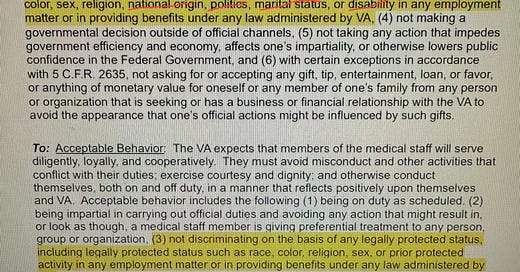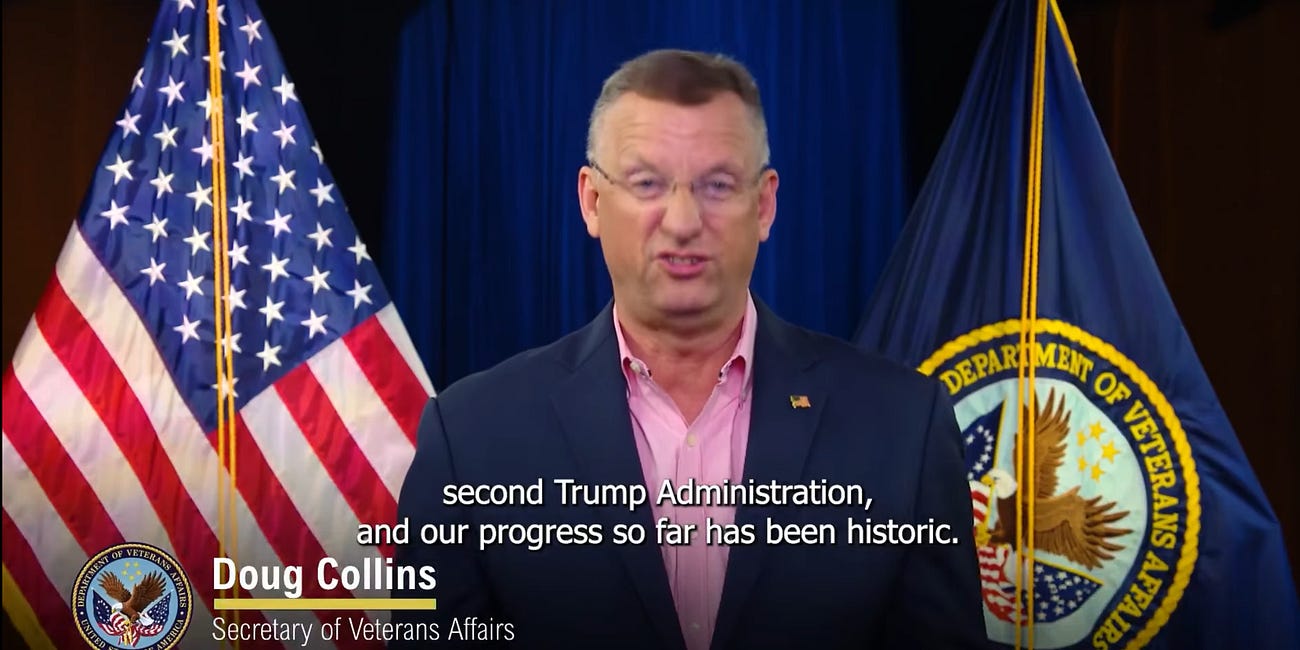The VA Just Made It Easier to Discriminate—And They’re Calling It a “Formality”
A top-down policy change quietly removed civil rights protections for veterans and medical staff. The White House says it’s about “biological truth.” The AMA says it’s a threat to patient care.
The VA changed the rules—and wants you to think nothing changed.
Earlier today, The Guardian published a bombshell report about changes to the Department of Veterans Affairs’ hospital bylaws. The story quickly went viral: “Doctors at Department of Veterans Affairs hospitals nationwide could refuse to treat unmarried veterans and Democrats under new hospital guidelines imposed following an executive order by Donald Trump.”
VA leadership rushed to call it “disinformation.” They demanded a retraction. And they issued a flurry of responses to press insisting that no veteran would be turned away.
But here’s the thing: The Guardian’s core claim is true.
The VA did, in fact, revise its bylaws—and those revisions eliminated explicit protections against discrimination based on political affiliation, marital status, and other personal characteristics.
The new language replaces those protections with a vague reference to “legally protected status”—a term with no fixed definition and no clear enforcement mechanism. And contrary to the VA’s spin, this wasn’t just a technical edit. It was a nationwide policy change affecting over 170 VA hospitals and more than 26,000 doctors.
It happened quietly. It happened quickly. And it happened in direct response to a sweeping executive order from Donald Trump—one that aims to reshape every federal agency around the ideology of gender essentialism and right-wing identity politics.
The VA has already used this order to deny lifesaving care
If there were any doubt about how the administration planned to enforce this ideology, the VA answered it in March.
In a press release titled "VA to phase out treatment for gender dysphoria," Secretary Doug Collins announced that the department would no longer provide hormone therapy or any medical care intended to treat gender dysphoria—except for veterans already receiving it before the cutoff.
Collins framed the move as a compassionate reallocation of resources: the money, he said, would go to paralyzed veterans and amputees. But in reality, this was a blatant attempt to pit one group of vulnerable veterans against another.
And Collins didn’t just authorize the change—he bragged about it. “I mean no disrespect to anyone,” he said, before suggesting that veterans seeking gender-affirming care should pay for it themselves. The press release emphasized how little the program cost, downplayed the number of trans veterans served, and took aim at services like speech therapy, prosthetics, and post-surgical recovery aids.
Collins has since gone on to gleefully boast about the VA eliminating this life-saving care for trans veterans in several social media posts.
This was the clearest possible signal: causing pain and suffering was the point.
And now the political appointees at the VA are doing the same thing again—this time, not just targeting one community, but stripping away protections for everyone.
VA Physicians Are Quietly Resisting the Trump Administration’s War on Veterans' Care
The Department of Veterans Affairs is under attack.
What the new VA policy actually says
Until recently, the VA’s national medical staff bylaws prohibited discrimination on the basis of race, age, color, sex, religion, national origin, politics, marital status, or disability—both in hiring and in the delivery of care.
Now, that list has been altered to remove several specific protections, including political affiliation, marital status, and national origin.
The updated bylaw says only that VA staff must not discriminate based on “any legally protected status,” without defining what that includes or excludes. Protections tied to politics, marital status, and national origin—none of which are consistently protected by federal civil rights statutes—are no longer guaranteed.
In practice, this means:
Staff could refuse care to someone because of their politics, marital status, or personal background—as long as it doesn’t violate federal law.
Doctors could be hired or fired based on characteristics that used to be explicitly off-limits.
Patients have less clarity, and fewer formal assurances, that they will be treated with impartiality.
And VA leadership admits that these changes were made to comply with Trump’s executive order titled “Defending Women from Gender Ideology Extremism and Restoring Biological Truth to the Federal Government.” Yet when asked why that meant removing references to characteristics like political affiliation, marital status, and national origin—categories not mentioned in the order—they offered no clear explanation. Instead, they repeatedly assured reporters that "federal law prohibits" such discrimination, even though these categories are not explicitly protected under most federal civil rights statutes.
What the executive order demands
Trump’s January 20, 2025 executive order redefines key federal terms like “sex,” “male,” and “female,” and orders all agencies to:
Remove references to “gender identity”
Treat sex as binary and immutable
Eliminate all internal policies deemed to promote “gender ideology”
Revoke guidance tied to LGBTQ+ rights, Title IX enforcement, and workplace harassment
It also requires agencies to rewrite their forms, communications, and internal policies to reflect this worldview. And it explicitly directs agency heads to report back within 120 days on how they are implementing these changes.
The VA’s bylaw revision is not an isolated decision. It is a compliance move, mandated from the top.
The AMA, VA doctors, and ethics experts are sounding the alarm
Medical professionals across the country are raising serious concerns about how these changes were made—and what they signal.
Dr. Arthur Caplan, a leading bioethicist at NYU, called the new VA policies “extremely disturbing and unethical” in the story from The Guardian. Dr. Kenneth Kizer, who led VA healthcare under President Clinton, warned they “open the door to discrimination on the basis of anything that is not legally protected.”
But the most urgent warnings are coming from inside the system itself.
A network of concerned VA clinicians—including many still working in federal hospitals—have pointed to the process by which these changes were imposed as the clearest red flag. VA headquarters (known as VACO) bypassed local hospital governance and unilaterally rewrote bylaws across the entire system. That’s a direct violation of medical staff self-governance standards, as affirmed by the Joint Commission and the American Medical Association.
At its annual conference this month, the AMA passed a formal resolution calling on all hospitals—including VA—to respect the right of medical staff to vote on their own bylaws.
This isn’t just about the content of the changes. It’s about who controls how medicine is practiced inside a federal system—and what happens when that control is seized by political actors instead of medical professionals.
The VA says “don’t worry.” History says: worry.
VA spokespersons (and whoever runs their Twitter account) insist that veterans will still receive all the care they’ve earned under federal law. That’s true—for now—unless they’re trans.
But history shows us that the removal of explicit protections is never neutral.
We’ve seen this tactic before: redefine terms, narrow interpretations, ignore the law, then claim it’s part of the Administration’s political “mandate.” That’s what allowed this administration to purge civil rights guidance, roll back protections for LGBTQ+ people, and push anti-union mandates in federal workplaces. That’s what enabled the creation of the Department of Government Efficiency (DOGE), which now has sweeping surveillance powers over federal workers. And that’s exactly what’s happening here.
You don’t need to believe every hypothetical scenario in The Guardian article to be alarmed. You just need to ask why, in the middle of a national crisis over veteran suicide, workforce shortages, and access to care, the Trump administration made rewriting nondiscrimination language its priority.
What this means for veterans—and for all of us
This isn’t just a VA issue. This is a test run for authoritarian governance inside public institutions.
If political appointees can erase basic rights with a pen stroke—while calling it a formality—they’ll do it again.
What’s at stake isn’t just whether a veteran is denied care tomorrow. It’s whether the federal government is still committed to impartial public service at all.
When bureaucrats override doctors, when ideology trumps ethics, and when protections are quietly dismantled while they gaslight us claiming nothing’s changed—we are clearly no longer operating in a democracy that serves everyone equally.
This is the kind of bureaucratic erosion that On Tyranny warns about—authoritarianism doesn’t arrive with jackboots. It arrives through administrative edits and euphemisms, through normalization of overreach and the silencing of professional standards. It arrives when fear keeps good people quiet.
As Masha Gessen warns in Surviving Autocracy, the moment we begin parsing whether a given act of exclusion is technically illegal rather than morally unacceptable, we’ve already surrendered the principle. The loss of explicit protections at VA facilities isn’t just policy drift—it’s a moral downgrade.
What needs to happen next
Congress must step in. The VA Inspector General should investigate how these changes were implemented. And lawmakers should immediately introduce legislation to restore the full list of nondiscrimination protections in federal healthcare—explicitly.
That work has already begun. As this piece was being finalized, Ranking Member Mark Takano and four Democratic healthcare practitioners on the House Committee on Veterans’ Affairs released a joint statement condemning the VA’s actions. They called the changes "reprehensible" and warned that allowing discrimination based on marital status and political views “puts VA doctors and their patients in an untenable position and risks compromising veterans’ care.” They emphasized what should be obvious: that serving all veterans—regardless of their beliefs or relationship status—isn’t political. It’s foundational.
The books we’ve added to the Antifascist Book Club reading list at Veterans Fighting Fascism—from Strongmen to Autocracy, Inc.—all emphasize the same core truth: technocratic authoritarianism works best when institutions collapse inward and the public assumes that someone else is watching. We can’t afford that assumption.
Veterans deserve better than vague legalisms and partisan compliance maneuvers. They deserve clarity, consistency, and care based on their service—not their politics.
And we all deserve a government that doesn’t weaponize healthcare to punish identity and reward conformity. That starts by fighting for it—now.






This is some pretty serious B*******. I mean there's lots to be outraged about but this is extremely outrageous
Kris, you are an exceptionally fine writer.
The Masha Gessen quote should chill us all.